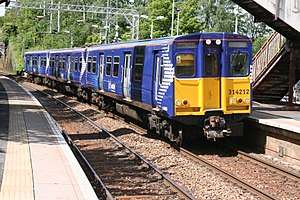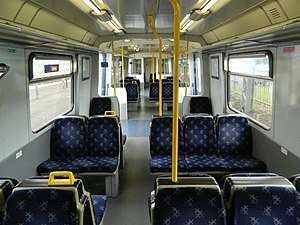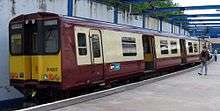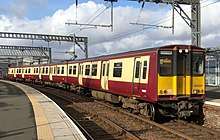British Rail Class 314
The British Rail Class 314 alternating current (AC) electric multiple units (EMU) were built by BREL York works in 1979. They were the third variety of British Rail's then-standard 1972 design for suburban EMUs, which eventually encompassed 755 vehicles and five classes (Class 313/314/315/507/508). They operated on 25 kV overhead line, the fleet worked inner-suburban services on the Strathclyde rail network in Scotland. The class ran to a top speed of 70 mph (113 km/h).[1][2]
| British Rail Class 314 | |
|---|---|
 First ScotRail 314212 at Patterton in 2011 | |
 The interior of a ScotRail refurbished Class 314 | |
| In service | 1979 – 2019 |
| Manufacturer | British Rail Engineering Limited |
| Built at | BREL York |
| Family name | BREL 1972 "PEP" |
| Constructed | 1979 |
| Refurbished | 2006-2007 2009-2010 2011-2013 |
| Number built | 16 trainsets |
| Number scrapped | 15 trainsets |
| Formation | 3 cars per trainset DMSO+PTSO+DMSO |
| Fleet numbers | 314201-216 |
| Capacity | 212 seats |
| Operator(s) | British Rail ScotRail (British Rail) ScotRail (National Express) First ScotRail Abellio ScotRail |
| Depot(s) | Hyndland Glasgow Shields Road TMD |
| Line(s) served | Argyle Line North Clyde Line Cathcart Circle Lines Inverclyde Line Paisley Canal Line |
| Specifications | |
| Car length | 19.80 m (64 ft 11 1⁄2 in) |
| Width | 2.82 m (9 ft 3 in) |
| Height | 3.58 m (11 ft 9 in) |
| Floor height | 1,156 mm (3 ft 9 1⁄2 in) |
| Maximum speed | 70 mph (113 km/h) |
| Weight | 102.5 t (100.9 long tons; 113.0 short tons) |
| Power output | 656 kW (880 hp) |
| Electric system(s) | 25 kV 50 Hz AC Overhead |
| Track gauge | 1,435 mm (4 ft 8 1⁄2 in) standard gauge |


Description
Sixteen Class 314 3-car units were introduced in late 1979 to operate on the then newly opened Argyle Line and were used on both this and the North Clyde Line routes until October 1999, when the scrapping of most of the Class 303 stock resulted in their being transferred to Cathcart Circle services.[3] The Class 314 was based on the experimental Class 445 or "PEP" unit, the design of which spawned the sister Class 313 and Class 315 units which are used extensively in the London commuter area.
In line with the other PEP-based classes, the Class 314 units consisted of two outer motor cars with an unpowered trailer vehicle in the middle, giving a technical description of DMSO+PTSO+DMSO. The coaches were of integral aluminium alloy construction based on a steel underframe. Each 3-car set could seat up to 220 people, and following the standard practice in the Glasgow suburban sector, peak time services could be formed by operating two units in multiple to form a 6-car train.
Operations
From 1999, they were mostly found working on the Cathcart Circle Line services to Cathcart, Neilston and Newton. The Class 314s also operated the Paisley Canal Line during off-peak times following the electrification of the branch in November 2012.[4] A small number of units also worked Inverclyde Line services to Gourock and Wemyss Bay, mostly during peak hours. They were replaced by Class 380 trains on this line, but then returned to share the service with 380s. They were also occasionally seen on the Ayrshire Coast Line, particularly when extreme weather affected the availability of other ScotRail EMUs.
The Class 314s were retired in 2019, the introduction of Class 385s resulting in the cascading of the Class 318s and Class 320s onto the lines operated by the 314s.[5] Scotrail announced that replacement by 385s would begin on the Inverclyde Line from 19 May 2019, with 314s only taking three early morning Gourock services each day.[6]
Incidents
The leading motor coach of unit 314203 was replaced by an ex-Class 507 coach after the original was destroyed in the Newton rail crash in July 1991. The unit re-entered service in May 1996.[3]
Units 314208 and 314212 were severely damaged when they were "drowned" in an Argyle Line tunnel following the River Kelvin bursting its banks in torrential rain at the end of 1994.[7]
Overhaul and refurbishment
In May 2006, a limited mechanical overhaul programme to the units was initiated, with upgraded door mechanisms and upgrades to the electrics and Automatic Warning System (AWS) equipment. 314202 lost its classic Strathclyde orange/black livery (the last remaining operational multiple unit in Scotland to carry the old livery) in favour of the carmine/cream scheme when it passed through Glasgow Works at the end of November 2006. 314206 entered Glasgow Works on 20 July 2007. This was to be the final unit to receive a major overhaul, pending a decision on the future of the Class 314 units.
In 2009/2010, all Class 314s received a life extension overhaul (C5E). The work included:
- Bogie change
- Cab works
- Various other modifications[8]
In 2011, the Class 314s underwent a C3 overhaul/relivery at Railcare Springburn. All 16 sets were refurbished internally, whilst five units received the new ScotRail saltire livery.
- Any corrosion repairs required
- Relivery (5 units only)
- Internal repaint
- Internal lino replacement on floor
- Replacement seat inserts/covers
- Full bogie/buckeye overhaul
- Further reliability upgrades
However, three of the first four units only received a C4 overhaul and internal works.[9][10]

In September 2008, the Scottish Government's agency Transport Scotland announced that all ScotRail trains (including from the Strathclyde Partnership for Transport) would be eventually repainted in a new, blue livery with white Saltire markings on the carriage ends. Relivery of the first unit - 314 212 - took place in spring 2011.[9]
In 2016, 2 other Class 314 units (314209 & 314214) were also repainted into the Saltire livery.[11] 314201, 202, 205, 206, 207, 210, 213, 215 & 216 all remained in the debranded SPT Carmine & Cream livery.[11] These units were the last units (apart from one car of the preserved Class 303) to carry the SPT Carmine & Cream livery.
Withdrawal
Withdrawal of the units began on 21 September 2018 when units 314207, 314212 and 314213 were retired from service, although 314207 and 314213 were temporarily returned to service on 5 October 2018 due to unavailability of the newer Class 385 fleet. On 9 January 2019, 314212 was taken to Glasgow Works at Springburn where it was stripped of spare parts before being delivered by road to England for scrapping; it was the first unit of the fleet to be scrapped.
14 December 2019 marked the end of Class 314 passenger service with 314216 working the last service from Paisley Canal to Glasgow Central.[12] ScotRail held a farewell tour for the class on 18 December 2019 with units 314202 and 314205 operating a special service around the ScotRail network, running to Ayr, Carstairs, Cumbernauld and Helensburgh. The tour raised funds for ScotRail's charity partner MND Scotland. [13]
Hydrogen Conversion
In February 2020, ScotRail announced plans to convert one of the two remaining units, 314209, to run on hydrogen. This is a feasibility study running alongside ScotRail's commitment to run no diesel trains by 2035.[14] It will be carried out by Brodie Engineering, alongside Arcola Energy, and input from the University of St Andrews.
Fleet details
| Class | Operator | No. | Year Built | Cars per Set | Unit nos. |
|---|---|---|---|---|---|
| Class 314 | Hydrogen Conversion | 1 | 1979 | 3 | 314209 |
| Scrapped | 15 | 314201-208, 314210-216 |
Named unit
- 314203 - European Union (named 1996, denamed 2011)[11]
Diagrams
![]()
![]()
![]()
![]()
References
| Wikimedia Commons has media related to British Rail Class 314. |
- "Regional Passenger Trains | Angel Trains". www.angeltrains.co.uk. Archived from the original on 17 February 2018. Retrieved 16 February 2018.
- Pritchard, Robert; Hall, Peter (2018). British Railways Locomotives & Coaching Stock 2018. Sheffield: Platform 5 Publishing. p. 267. ISBN 978-1-909431-44-7.CS1 maint: ref=harv (link)
- "Class 314". Archived from the original on 25 January 2019. Retrieved 25 January 2019.
- "scot-rail.co.uk » Photo » 314204 Enters Corkerhill". Archived from the original on 4 March 2016. Retrieved 5 December 2012.
- "Withdrawal of Scottish veteran EMUs relies on stock cascades". Archived from the original on 11 March 2018. Retrieved 10 March 2018.
- Now, Inverclyde (10 May 2019). "BRAND New Trains To Feature In Inverclyde As 40-Year-Old Units Sidelined". News. Retrieved 10 May 2019.
- "hiddenglasgow::Glasgow Central Low Level Railway Flood". Archived from the original on 11 February 2008. Retrieved 27 January 2011.
- "Class 314 C5E Overhaul". scot-rail.co.uk. Archived from the original on 25 March 2012. Retrieved 28 August 2011.
- "ScotRail starts refurbishment of Class 314 EMUs" (PDF). Railway Herald (264). 18 April 2011. p. 3. Archived from the original (PDF) on 7 October 2011. Retrieved 22 April 2011.
- "Class 314 Relivery and Overhaul 2011-2012". scot-rail.co.uk. Archived from the original on 21 July 2011. Retrieved 2 April 2011.
- "Class 314 Formations". Archived from the original on 25 January 2019. Retrieved 25 January 2019.
- "ScotRail on Twitter". Retrieved 10 November 2019.
- "ScotRail announces Class 314 farewell tour". Retrieved 21 December 2019.
- "Scotland Plans to Build and Test a Hydrogen-Powered Train". Gizmodo UK. Retrieved 29 February 2020.